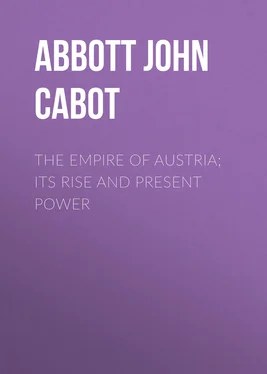John Abbott - The Empire of Austria; Its Rise and Present Power
Здесь есть возможность читать онлайн «John Abbott - The Empire of Austria; Its Rise and Present Power» — ознакомительный отрывок электронной книги совершенно бесплатно, а после прочтения отрывка купить полную версию. В некоторых случаях можно слушать аудио, скачать через торрент в формате fb2 и присутствует краткое содержание. Жанр: Путешествия и география, История, foreign_edu, foreign_antique, foreign_prose, на английском языке. Описание произведения, (предисловие) а так же отзывы посетителей доступны на портале библиотеки ЛибКат.
- Название:The Empire of Austria; Its Rise and Present Power
- Автор:
- Жанр:
- Год:неизвестен
- ISBN:нет данных
- Рейтинг книги:3 / 5. Голосов: 1
-
Избранное:Добавить в избранное
- Отзывы:
-
Ваша оценка:
- 60
- 1
- 2
- 3
- 4
- 5
The Empire of Austria; Its Rise and Present Power: краткое содержание, описание и аннотация
Предлагаем к чтению аннотацию, описание, краткое содержание или предисловие (зависит от того, что написал сам автор книги «The Empire of Austria; Its Rise and Present Power»). Если вы не нашли необходимую информацию о книге — напишите в комментариях, мы постараемся отыскать её.
The Empire of Austria; Its Rise and Present Power — читать онлайн ознакомительный отрывок
Ниже представлен текст книги, разбитый по страницам. Система сохранения места последней прочитанной страницы, позволяет с удобством читать онлайн бесплатно книгу «The Empire of Austria; Its Rise and Present Power», без необходимости каждый раз заново искать на чём Вы остановились. Поставьте закладку, и сможете в любой момент перейти на страницу, на которой закончили чтение.
Интервал:
Закладка:
Thus suddenly clouds gathered around Rhodolph, and many of his friends despaired of his cause. He appealed to the princes of the German empire, and but few responded to his call. His sons-in-law, the Electors of Palatine and of Saxony, ventured not to aid him in an emergence when defeat seemed almost certain, and where all who shared in the defeat would be utterly ruined. In June, 1275, Ottocar marched from Prague, met his allies at the appointed rendezvous, and threading the defiles of the Bohemian mountains, approached the frontiers of Austria. Rhodolph was seriously alarmed, for it was evident that the chances of war were against him. He could not conceal the restlessness and agitation of his spirit as he impatiently awaited the arrival of troops whom he summoned, but who disappointed his hopes.
"I have not one," he sadly exclaimed, "in whom I can confide, or on whose advice I can depend."
The citizens of Vienna perceiving that Rhodolph was abandoned by his German allies, and that they could present no effectual resistance to so powerful an army as was approaching, and terrified in view of a siege, and the capture of the city by storm, urged a capitulation, and even begged permission to choose a new sovereign, that they might not be involved in the ruin impending over Rhodolph. This address roused Rhodolph from his despondency, and inspired him with the energies of despair. He had succeeded in obtaining a few troops from his provinces in Switzerland. The Bishop of Basle, who had now become his confessor, came to his aid, at the head of a hundred horsemen, and a body of expert slingers. Rhodolph, though earnestly advised not to undertake a battle with such desperate odds, marched from Vienna to meet the foe.
Rapidly traversing the southern banks of the Danube to Hamburg, he crossed the river and advanced to Marcheck, on the banks of the Morava. He was joined by some troops from Styria and Carinthia, and by a strong force led by the King of Hungary. Emboldened by these accessions, though still far inferior in strength to Ottocar, he pressed on till the two armies faced each other on the plains of Murchfield. It was the 26th of August, 1278.
At this moment some traitors deserting the camp of Ottocar, repaired to the camp of Rhodolph and proposed to assassinate the Bohemian king. Rhodolph spurned the infamous offer, and embraced the opportunity of seeking terms of reconciliation by apprising Ottocar of his danger. But the king, confident in his own strength, and despising the weakness of Rhodolph, deemed the story a fabrication and refused to listen to any overtures. Without delay he drew up his army in the form of a crescent, so as almost to envelop the feeble band before him, and made a simultaneous attack upon the center and upon both flanks. A terrific battle ensued, in which one party fought, animated by undoubting confidence, and the other impelled by despair. The strife was long and bloody. The tide of victory repeatedly ebbed and flowed. Ottocar had offered a large reward to any of his followers who would bring to him Rhodolph, dead or alive.
A number of knights of great strength and bravery, confederated to achieve this feat. It was a point of honor to be effected at every hazard. Disregarding all the other perils of the battle, they watched their opportunity, and then in a united swoop, on their steel-clad chargers, fell upon the emperor. His feeble guard was instantly cut down. Rhodolph was a man of herculean power, and he fought like a lion at bay. One after another of his assailants he struck from his horse, when a Thuringian knight, of almost fabulous stature and strength, thrust his spear through the horse of the emperor, and both steed and rider fell to the ground. Rhodolph, encumbered by his heavy coat of mail, and entangled in the housings of his saddle, was unable to rise. He crouched upon the ground, holding his helmet over him, while saber strokes and pike thrusts rang upon cuirass and buckler like blows upon an anvil. A corps of reserve spurred to his aid, and the emperor was rescued, and the bold assailants who had penetrated the very center of his army were slain.
The tide of victory now set strongly in favor of Rhodolph, for "the race is not always to the swift, nor the battle to the strong." The troops of Bohemia were soon everywhere put to rout. The ground was covered with the dead. Ottocar, astounded at his discomfiture, and perhaps fearing the tongue of his wife more than the sabers of his foes, turned his back upon his flying army, and spurred his horse into the thickest of his pursuers. He was soon dismounted and slain. Fourteen thousand of his troops perished on that disastrous day. The body of Ottocar, mutilated with seventeen wounds, was carried to Vienna, and, after being exposed to the people, was buried with regal honors.
Rhodolph, vastly enriched by the plunder of the camp, and having no enemy to encounter, took possession of Moravia, and triumphantly marched into Bohemia. All was consternation there. The queen Cunegunda, who had brought these disasters upon the kingdom, had no influence. Her only son was but eight years of age. The turbulent nobles, jealous of each other, had no recognized leader. The queen, humiliated and despairing, implored the clemency of the conqueror, and offered to place her infant son and the kingdom of Bohemia under his protection. Rhodolph was generous in this hour of victory. As the result of arbitration, it was agreed that he should hold Moravia for five years, that its revenues might indemnify him for the expenses of the war. The young prince, Wenceslaus, was acknowledged king, and during his minority the regency was assigned to Otho, margrave or military commander of Brundenburg. Then ensued some politic matrimonial alliances. Wenceslaus, the boy king, was affianced to Judith, one of the daughters of Rhodolph. The princess Agnes, daughter of Cunegunda, was to become the bride of Rhodolph's second son. These matters being all satisfactorily settled, Rhodolph returned in triumph to Vienna.
The emperor now devoted his energies to the consolidation of these Austrian provinces. They were four in number, Austria, Styria, Carinthia and Carniola. All united, they made but a feeble kingdom, for they did not equal, in extent of territory, several of the States of the American Union. Each of these provinces had its independent government, and its local laws and customs. They were held together by the simple bond of an arbitrary monarch, who claimed, and exercised as he could, supreme control over them all. Under his wise and energetic administration, the affairs of the wide-spread empire were prosperous, and his own Austria advanced rapidly in order, civilization and power. The numerous nobles, turbulent, unprincipled and essentially robbers, had been in the habit of issuing from their castles at the head of banditti bands, and ravaging the country with incessant incursions. It required great boldness in Rhodolph to brave the wrath of these united nobles. He did it fearlessly, issuing the decree that there should be no fortresses in his States which were not necessary for the public defense. The whole country was spotted with castles, apparently impregnable in all the strength of stone and iron, the secure refuge of high-born nobles. In one year seventy of these turreted bulwarks of oppression were torn down; and twenty-nine of the highest nobles, who had ventured upon insurrection, were put to death. An earnest petition was presented to him in behalf of the condemned insurgents.
"Do not," said the king, "interfere in favor of robbers; they are not nobles, but accursed robbers, who oppress the poor, and break the public peace. True nobility is faithful and just, offends no one, and commits no injury."
CHAPTER II.
REIGNS OF ALBERT I, FREDERIC, ALBERT AND OTHO
Anecdotes Of Rhodolph.—His Desire For The Election Of His Son.—His Death.—Albert.—His Unpopularity.—Conspiracy Of The Nobles.—Their Defeat.—Adolphus Of Nassau Chosen Emperor.—Albert's Conspiracy.—Deposition Of Adolphus And Election Of Albert.—Death Of Adolphus.—The Pope Defied.—Annexation Of Bohemia.—Assassination Of Albert.—Avenging Fury.—The Hermit's Direction.—Frederic The Handsome.—Election Of Henry, Count Of Luxemburg.—His Death.—Election Of Louis Of Bavaria.—Capture Of Frederic.—Remarkable Confidence Toward a Prisoner.—Death Of Frederic.—An Early Engagement.—Death Of Louis.—Accession Of Albert.
Читать дальшеИнтервал:
Закладка:
Похожие книги на «The Empire of Austria; Its Rise and Present Power»
Представляем Вашему вниманию похожие книги на «The Empire of Austria; Its Rise and Present Power» списком для выбора. Мы отобрали схожую по названию и смыслу литературу в надежде предоставить читателям больше вариантов отыскать новые, интересные, ещё непрочитанные произведения.
Обсуждение, отзывы о книге «The Empire of Austria; Its Rise and Present Power» и просто собственные мнения читателей. Оставьте ваши комментарии, напишите, что Вы думаете о произведении, его смысле или главных героях. Укажите что конкретно понравилось, а что нет, и почему Вы так считаете.










